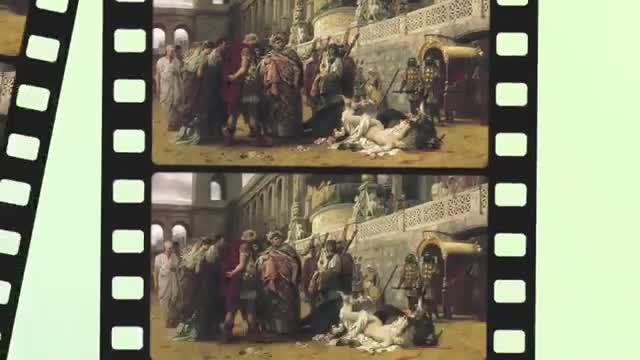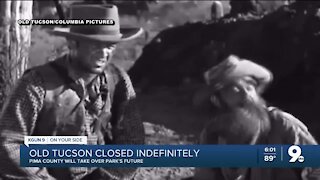Premium Only Content

Fat Old Hugh Grant plays Death of Nero
Comedic portrayal of Nero's death covering several issues badly, the death of Nero's mum by his command. His isolation. His reasons for killing Christians he labelled Atheists.
===
Impression based on theme of Nero and his death.
Nero (Latin: Nero Claudius Caesar Augustus Germanicus; 15 December 37 – 9 June 68), wasRoman Emperor from 54 to 68, and the last in the Julio-Claudian dynasty. Nero was adopted by his great-uncle Claudius to become his heir and successor, and succeeded to the throne in 54 following Claudius' death.
During his reign, Nero focused much of his attention on diplomacy, trade, and enhancing the cultural life of the Empire. He ordered theaters built and promoted athletic games. During his reign, the redoubtable general Corbulo conducted a successful war and negotiated peace with theParthian Empire. His general Suetonius Paulinus crushed a revolt in Britain. Also, he annexed theBosporan Kingdom to the Empire, and the First Roman–Jewish War began.
In 64, most of Rome was destroyed in the Great Fire of Rome, which many Romans believed Nero himself had started in order to clear land for his planned palatial complex, the Domus Aurea. In 68, the rebellion of Vindex in Gaul and later the acclamation of Galba in Hispania drove Nero from the throne. Facing assassination, he committed suicide on 9 June 68.
Nero's rule is often associated with tyranny and extravagance. He is known for many executions, including those of his mother and the probable murder by poison of his stepbrother, Britannicus.
He is also infamously known as the Emperor who "fiddled while Rome burned", although this is now considered an inaccurate rumor, and as an early persecutor of Christians. He was known for having captured Christians burned in his garden at night for a source of light. This view is based on the writings of Tacitus, Suetonius, and Cassius Dio, the main surviving sources for Nero's reign.
Few surviving sources paint Nero in a favorable light. Some sources, though, including some mentioned above, portray him as an emperor who was popular with the common Roman people, especially in the East.
The study of Nero is problematic as some modern historians question the reliability of ancient sources when reporting on Nero's tyrannical acts.
The revolt of Vindex and Galba and the death of Nero
Marble bust of Nero, Antiquarium of the Palatine.
Alleged Tomb of Nero
In March 68, Gaius Julius Vindex, the governor of Gallia Lugdunensis, rebelled against Nero's tax policies. Lucius Verginius Rufus, the governor of Germania Superior, was ordered to put down Vindex's rebellion. In an attempt to gain support from outside his own province, Vindex called uponServius Sulpicius Galba, the governor of Hispania Tarraconensis, to join the rebellion and further, to declare himself emperor in opposition to Nero. At the Battle of Vesontio in May 68, Verginius' forces easily defeated those of Vindex and the latter committed suicide. However, after putting down this one rebel, Verginius' legions attempted to proclaim their own commander as Emperor. Verginius refused to act against Nero, but the discontent of the legions of Germany and the continued opposition of Galba in Spain did not bode well for Nero.
While Nero had retained some control of the situation, support for Galba increased despite his being officially declared a public enemy. The prefect of the Praetorian Guard, Gaius Nymphidius Sabinus, also abandoned his allegiance to the Emperor and came out in support for Galba.
In response, Nero fled Rome with the intention of going to the port of Ostia and from there to take a fleet to one of the still-loyal eastern provinces. However, he abandoned the idea when some army officers openly refused to obey his commands, responding with a line from Vergil's Aeneid: "Is it so dreadful a thing then to die?" Nero then toyed with the idea of fleeing to Parthia, throwing himself upon the mercy of Galba, or to appeal to the people and beg them to pardon him for his past offences "and if he could not soften their hearts, to entreat them at least to allow him the prefecture of Egypt". Suetonius reports that the text of this speech was later found in Nero's writing desk, but that he dared not give it from fear of being torn to pieces before he could reach the Forum.
Nero returned to Rome and spent the evening in the palace. After sleeping, he awoke at about midnight to find the palace guard had left. Dispatching messages to his friends' palace chambers for them to come, he received no answers. Upon going to their chambers personally, he found them all abandoned. When he called for a gladiator or anyone else adept with a sword to kill him, no one appeared. He cried, "Have I neither friend nor foe?" and ran out as if to throw himself into the Tiber.
Returning, Nero sought for some place where he could hide and collect his thoughts. An imperial freedman offered his villa, located 4 miles outside the city. Travelling in disguise, Nero and four loyal servants reached the villa, where Nero ordered them to dig a grave for him. At this time, a courier arrived with a report that the Senate had declared Nero a public enemy and that it was their intention to execute him by beating him to death.
At this news, Nero prepared himself for suicide. Losing his nerve, he first begged for one of his companions to set an example by first killing himself. At last, the sound of approaching horsemen drove Nero to face the end. However he still could not bring himself to take his own life but instead he forced his private secretary, Epaphroditos, to perform the task. Nero's famous last words from this moment are "Qualis artifex pereo" or in english "What an artist dies in me!"
When one of the horsemen entered, upon his seeing Nero all but dead he attempted to stop the bleeding in vain. Nero died on 9 June 68.This was the anniversary of the death of Octavia. Nero was buried in the Mausoleum of the Domitii Ahenobarbi, in what is now the Villa Borghese (Pincian Hill) area of Rome.
With his death, the Julio-Claudian dynasty ended. Chaos ensued in the Year of the Four Emperors.
===
AUAWN1127111
http://conservativeweasel.blogspot.com/2011/11/death-of-nero.html
-
 2:50
2:50
Comedy
4 years agoFat old Hugh Grant
140 -
 1:03
1:03
BANG Showbiz EN
4 years agoMartine McCutcheon had crush on Hugh Grant
7 -
 1:26
1:26
Lilitan96
4 years agoSIMA plays
17 -
 0:48
0:48
FamilyFun
4 years ago4 Year Old Plays Enjoys Rain Storm
141 -
 0:08
0:08
TrainingDogs
4 years agoPuppy plays outside!
352 -
 0:15
0:15
HeroicIndustries
4 years ago $0.03 earnedSandbag death March
122 -
 0:54
0:54
IreneMontoya2012
4 years ago $0.02 earnedDeath Valley Sunset
1641 -
 1:33
1:33
KGUN
4 years agoTHE DEATH OF OLD TUCSON
33 -
 1:47
1:47
Banjo The German Shepherd
4 years agoPlays the Fetch
39 -
 4:15
4:15
OverlandDudes
4 years agoOverland Death Valley
149